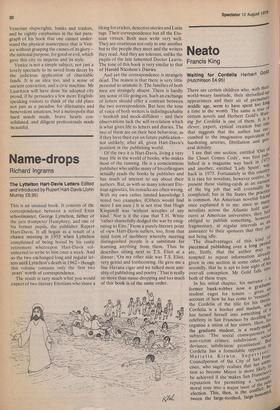Name-drops
Richard Ingrams
The Lyttelton Hart-Davis Letters Edited and introduced by Rupert Hart-Davis (John Murray £6.95) This is an unusual book. It. consists of the correspondence between a retired Eton schoolmaster, George Lyttelton, father of the jazz trumpeter Humphrey, and one of his former pupils, the publisher Rupert Hart-Davis. It all began as a result of a chance meeting in 1955 when Lyttelton complained of being bored by his rustic retirement whereupon Hart-Davis volunteered to write to him once a week. And so the two exchanged long and regular letters until Lyttelton's death in 1962 —though this volume contains only the first two years' worth of correspondence.
The result is very much what you would expect of two literary Etonians who share a
liking for cricket, detective stories and Latin tags. Their correspondence has all the Etonian virtues. Both men write very well. They are courteous not only to one another but to the people they meet and the writers they read. And they are tolerant, unlike the pupils of the late lamented Doctor Leavis. The tone of this book is very similar to that of Harold Nicolson's Diaries.
And yet the correspondence is strangely dead. The reason is that there is very little personal to animate it. The families of both men are strangely absent. There is hardly any sense of life going on. Such an exchange of letters should offer a contrast between the two correspondents. But here the tone of voice of both writers is indistinguishable — bookish and mock-diffident — and their observations lack the self-revelation which is what gives life to letters and diaries. The two of them are on their best behaviour, as if they have their eye on future publication— not unlikely, after all, given Hart-Davis's position in the publishing world.
Of the two it is Hart-Davis, living a very busy life in the world of books, who makes most of the running. He is a conscientious publisher who unlike many of his colleagues actually reads the books he publishes and has much of interest to say about their authors. But, as with so many tolerant Etonian agnostics, his remarks are often wrong. With my own rather limited knowledge I noted two examples. (Others would find more I am sure.) It is not true that Hugh Kingsmill was 'without scruples of any kind.' Nor is it the case that T.H. White 'rather shamefully dodged the war by emigrating to Eire.' From a purely literary point of view Hart-Davis suffers, too, from that mild form of snobbery whereby meeting distinguished people is a substitute for learning anything from them. Thus he describes sitting next to T.S. Eliot at a dinner: 'On my other side was T.S. Eliot, very genial and forthcoming. He gave me a fine Havana cigar and we talked most amiably of publishing and poetry.' That is really no more than name-dropping and too much of this book is of the same order.






























 Previous page
Previous page